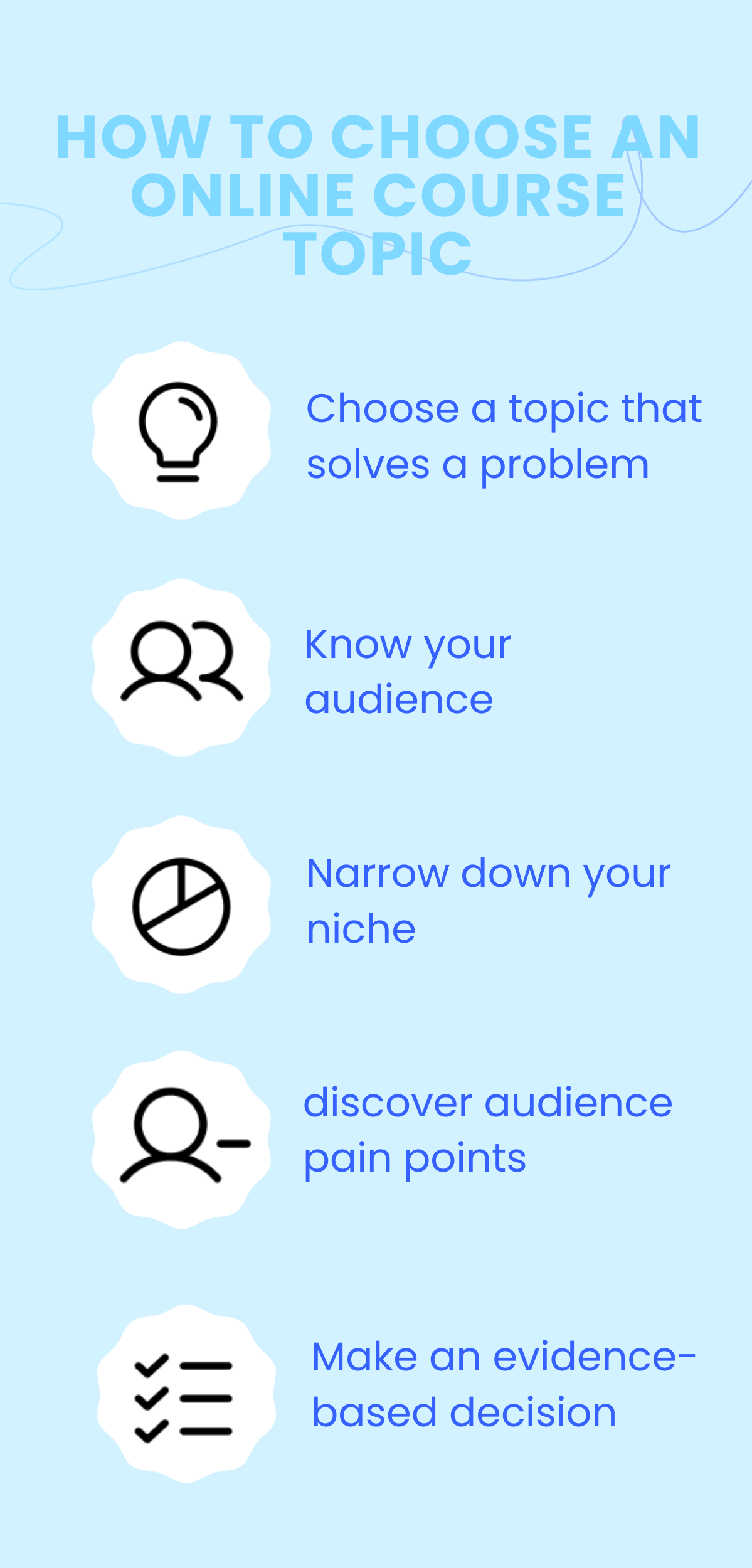Choosing the right online course can be challenging. There are many options available.
How to Choose Online Courses can be challenges. Finding the perfect online course involves more than just reading reviews. You need to consider your goals, your learning style, and the course content. Online learning offers flexibility and convenience, but it also requires self-discipline. Understanding what you need from a course can help you make the best choice.
This guide will help you navigate the process. We will explore key factors to consider, such as course quality, instructor expertise, and available resources. By the end, you will be equipped to choose an online course that fits your needs and helps you achieve your learning goals.

Credit: instructor-academy.onlinecoursehost.com
Identify Your Goals
Choosing the right online course can be a challenge. One key step to make this easier is to identify your goals. Knowing what you want to achieve helps you find the perfect course. Your goals might be career advancement or skill improvement. Let’s explore these in detail.
Career Advancement
Many people take online courses to advance their careers. These courses can help you move up in your current job or switch to a new field. Here are some tips:
- Look for courses that are recognized in your industry.
- Check if the course provides a certificate or accreditation.
- Consider the skills that are in demand in your field.
For career advancement, practical skills are essential. Make sure the course includes hands-on projects or case studies.
Skill Improvement
Improving your skills is another common goal. Whether it’s for a hobby or personal development, online courses offer a wide range of options. Here’s what to keep in mind:
- Identify the specific skills you want to improve.
- Choose courses that offer practical exercises.
- Read reviews to ensure the course content is high-quality.
Skill improvement courses often include video tutorials, quizzes, and interactive sessions. These features can make learning more engaging.
Research Course Providers
Choosing the right online course can be overwhelming. Researching course providers is crucial. This ensures you get quality education and value for your money. Below are key factors to consider when researching course providers.
Reputation
Check the reputation of the course provider. A provider’s reputation speaks volumes about their quality. Look for reviews and ratings online. Positive reviews indicate a good experience for past students. Negative reviews can be a red flag.
Visit forums and social media. See what people say about the provider. Word-of-mouth recommendations are also valuable. Ask friends or colleagues if they have any suggestions.
Accreditation
Accreditation is essential. It ensures the course meets quality standards. Accredited courses are recognized by employers and institutions. Verify the provider’s accreditation status. You can check this on their website or contact them directly.
Below is a table to help you understand the importance of accreditation:
| Accredited Courses | Non-Accredited Courses |
|---|---|
| Recognized by employers | May not be recognized |
| Meet quality standards | Quality may vary |
| Transferable credits | Credits may not transfer |
Ensure the course provider is accredited by a reputable organization. This will save you from future disappointments.
Evaluate Course Content
Choosing the right online course can be a daunting task. One crucial aspect to consider is the course content. Evaluating the course content ensures you get the best value for your time and money. This section will guide you through reviewing the syllabus and understanding the learning outcomes.
Syllabus Review
The syllabus is like a roadmap for the course. It provides a detailed outline of what you will learn. Look for a comprehensive syllabus that covers all the key topics. Check if the course includes practical assignments and projects. These elements are essential for applying what you learn.
A good syllabus should also mention the course duration. Shorter courses might be too rushed, while longer ones might be too slow. Find a balance that fits your learning pace. Additionally, check if the course offers supplementary materials. These can include reading lists, videos, and other resources that enhance learning.
| Key Elements | Description |
|---|---|
| Topics Covered | Ensure all key areas are included. |
| Practical Assignments | Look for hands-on projects. |
| Course Duration | Choose a length that fits your schedule. |
| Supplementary Materials | Check for additional resources. |
Learning Outcomes
Learning outcomes describe what you will be able to do after completing the course. They should be clear and measurable. For example, “By the end of this course, you will be able to create a website.” Such statements help you understand the skills you will gain.
Review the learning outcomes to ensure they align with your goals. If you want to learn programming, the outcomes should include writing code. Look for courses that offer certificates upon completion. A certificate can add value to your resume or portfolio.
Consider the teaching methods mentioned in the learning outcomes. Do they include interactive elements like quizzes or group discussions? Interactive learning often leads to better understanding and retention.
- Clear and measurable outcomes
- Alignment with your goals
- Certificate of completion
- Interactive teaching methods
Check Instructor Credentials
Choosing the right online course can be daunting. One key factor is to check instructor credentials. This ensures you learn from qualified professionals.
Professional Experience
An instructor’s professional experience is crucial. Look for the following:
- Years in the industry
- Relevant job positions
- Notable achievements
Experienced instructors bring real-world knowledge. They provide practical insights. This enhances your learning experience.
Teaching Background
An instructor’s teaching background is equally important. Consider the following:
- Years of teaching experience
- Previous institutions taught at
- Student feedback and reviews
Effective teachers explain complex concepts simply. They keep students engaged. Good reviews often indicate a reliable instructor.
| Criteria | Importance |
|---|---|
| Professional Experience | Offers practical knowledge |
| Teaching Background | Ensures effective learning |
In summary, check both professional experience and teaching background. This ensures you choose the best online course.
Assess Course Format
Choosing the right online course involves understanding the course format. The format can greatly affect your learning experience. It’s essential to evaluate if the course structure fits your lifestyle and learning preferences.
Self-paced Vs. Scheduled
Self-paced courses allow you to learn at your own speed. You can complete the material in your own time. This is ideal for people with busy schedules or irregular work hours.
In contrast, scheduled courses have set timelines and deadlines. They often include live sessions or fixed submission dates. This can provide a structured environment and help keep you on track.
| Self-Paced | Scheduled |
|---|---|
| Flexible timing | Fixed schedule |
| Learn at your own speed | Structured learning path |
| Good for busy individuals | Good for structured learners |
Interactive Elements
Online courses can include various interactive elements to enhance learning. These elements can make the material more engaging and easier to understand.
- Quizzes: Test your knowledge with short quizzes.
- Discussion forums: Engage with peers and instructors.
- Live sessions: Participate in real-time with instructors.
- Assignments: Apply what you’ve learned in practical tasks.
Assessing these elements can help you choose a course that best fits your learning style. Interactive components can aid in better retention and understanding of the material.
Consider Time Commitment
Choosing the right online course requires careful planning. One key factor is time commitment. Understanding how much time you need each week and the overall course duration helps in making an informed decision.
Weekly Hours
Each online course has different weekly hour requirements. Some courses may need only a few hours per week. Others might need 10 or more hours. Check the course details to know the weekly hours. This ensures you can manage your time well.
Here is a simple table showing different weekly hour commitments:
| Course Type | Weekly Hours |
|---|---|
| Short Course | 2-5 hours |
| Certificate Program | 5-10 hours |
| Degree Program | 10+ hours |
Course Duration
Course duration varies widely. Some courses last a few weeks. Others span several months or even years. Knowing the duration helps in planning your schedule.
Here are some common course durations:
- Short Courses: 4-6 weeks
- Certificate Programs: 3-6 months
- Degree Programs: 1-4 years
Choose a course with a duration that matches your availability. This helps in balancing your other commitments.
Review Student Feedback
Choosing the right online course can be challenging. One effective way to make an informed decision is to review student feedback. Feedback from previous students provides real insights into the course quality. It helps you understand the strengths and weaknesses of the course.
Ratings And Reviews
Ratings and reviews are crucial indicators of a course’s quality. A high rating often means students found the course useful. Look for courses with consistent positive ratings. Reviews give you detailed opinions from past students.
- Positive Reviews: Highlight the course strengths.
- Negative Reviews: Point out potential issues.
- Detailed Reviews: Provide in-depth insights.
A table can help you compare ratings and reviews from different courses:
| Course | Rating | Number of Reviews | Positive Feedback | Negative Feedback |
|---|---|---|---|---|
| Course A | 4.8 | 1500 | 98% | 2% |
| Course B | 4.5 | 1200 | 90% | 10% |
Success Stories
Success stories from past students can be motivating. They show how the course helped others achieve their goals. Look for testimonials that describe real-world benefits.
- Career Advancement: Did the course help someone get a promotion?
- Skill Improvement: Did students gain new skills?
- Personal Growth: Did the course boost someone’s confidence?
Reading success stories can help you understand the potential impact of the course. They provide a glimpse into what you might achieve.

Credit: www.dyndevice.com
Compare Costs And Financial Aid
Choosing the right online course can be challenging. Comparing costs and financial aid options can make the decision easier. It’s important to look at tuition fees, scholarships, and discounts. This ensures you make the best choice for your budget.
Tuition Fees
Tuition fees can vary widely across different online courses. Some courses might be free, while others could cost thousands of dollars. It’s important to check what the fee covers. Does it include all materials, or are there extra costs? Compare multiple courses to find the best value for your money.
| Course | Tuition Fee | Included Materials |
|---|---|---|
| Course A | $500 | Yes |
| Course B | $300 | No |
| Course C | $1000 | Yes |
Scholarships And Discounts
Many online courses offer scholarships and discounts. These can help reduce the cost significantly. Check if you qualify for any scholarships. Some platforms provide discounts for early sign-ups or group enrollments. Make a list of potential discounts and apply for them. This can save you a lot of money.
- Check for early-bird discounts.
- Look for group enrollment offers.
- See if there are scholarships based on merit or need.
Taking time to research these options can make education more affordable.

Credit: www.thinkific.com
Frequently Asked Questions
What Factors Should I Consider When Choosing Online Courses?
Consider course content, instructor expertise, reviews, and cost. Check if the course fits your learning style and schedule.
How Do I Know If An Online Course Is Credible?
Look for accredited institutions, positive reviews, and qualified instructors. Verify the course’s industry recognition and relevance.
Are Free Online Courses Worth It?
Yes, many free courses offer high-quality content. However, they may lack certification or comprehensive resources compared to paid options.
How Do I Find The Best Online Courses?
Research platforms, read reviews, and compare course details. Seek recommendations from peers or industry experts.
Can I Balance Online Courses With A Full-time Job?
Yes, choose flexible courses with self-paced options. Prioritize time management and set a regular study schedule.
What Is The Best Platform For Online Courses?
Popular platforms include Coursera, Udemy, and edX. Each offers diverse courses, so choose based on your needs and preferences.
How Important Are Reviews In Choosing Online Courses?
Reviews provide insights into course quality and user experience. They help identify potential issues and advantages before enrolling.
Conclusion
Choosing the right online course can feel overwhelming. But it doesn’t have to be. Focus on your interests and goals. Read reviews to gauge course quality. Check for certifications and instructor expertise. Compare costs and course materials. Prioritize flexible schedules if you have a busy life.
Trust your instincts and take the plunge. The right course can boost your skills and career. Happy learning!



